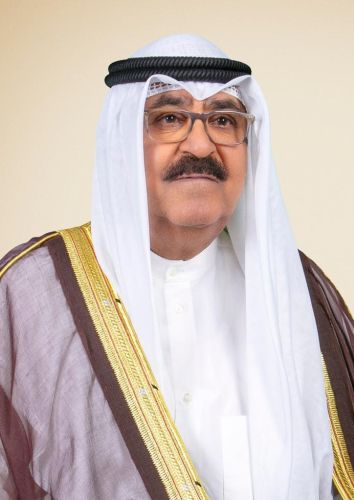Last modified: 16 January 2024
The country
The state is known as Dawlat Al-Kuwayt in its national language. This means the State of Kuwait. The country is being reigned by the Al-Sabah dynasty.
The island of Failaka was conquered by the Greeks in the 3rd century BC. The port of Characene was founded in 127 BC and had borders similar to present day Kuwait. Kuwait, previously called Guraine, was founded in 1705 by members of the Bani Utbah tribe. The descendants of the Anizah tribe, the families al-Khalifa, al-Sabah and al-Jalahma, arrived in Kuwait from Nejd around 1716 and took over the power in the region in 1732.
Soon the al-Sabah family gained power. The first ruler was Sabah I bin Jaber who died in 1762 and was succeeded by his son Abdullah who ruled until 1812. The al-Khalifa and al-Jalahima families left Kuwait in 1766. Mubarak al-Sabah in 1897 was recognised as sub-governor of Kuwait by the Ottoman sultan. He allowed the British to deploy gunboats along the coast of Kuwait and this policy gave Great Britain control of the foreign policy and national security of Kuwait. After World War I Kuwait became an independent sheikhdom under British protectorate. The country became only fully independent on 19 June 1961.

Sovereign
The current sovereign is Sheikh Mishal Al-Ahmad Al-Jaber Al-Sabah, 17th Emir of the State of Kuwait. He was born in Kuwait City on 27 September 1940. He became the Crown Prince of Kuwait on 8 October 2020.
He is the son of Sheikh Ahmad I Al-Jaber Al-Sabah, 10th Emir of the State of Kuwait (1885-1950) and his wife .
Enthronement
Sheikh Mishal succeeded his halfbrother Sheikh Nawaf Al-Ahmad Al-Jaber Al-Sabah, 16th Emir of the State of Kuwait (1937-2023) upon his death on 16 December 2023. He took the oath on 20 December 2023.
Other details
The Emir is a Muslim.
Marriage and descendants
Sheikh Mishal is married to Nuria Sabah Al-Salem Al-Sabah and to Munira Badah Al-Mutairi.
He has 12 children: 9 sons and 3 daughters.
Postal address
Office of the Emir
Al Diwan Al Amiri
Sief Palace-Building 100
State of Kuwait
Succession
Kuwait is an independent democratic sovereign Arab state and a hereditary emirate. The emir is the head of state and his person shall be immune and inviolable. Before an emir assumes his powers he shall take at oath at a special sitting of the National Assembly. If the emir is absent from the country, and the heir apparent is unable to act as deputy, the emir shall appoint a deputy who shall exercise his powers during his absence. The emir has legislative power and executive power, but shall exercise his powers through his ministers. He is also supreme commander of the armed forces.
The succession is limited to the descendants of Mubarak al-Sabah. The heir apparent has to be chosen within one year from the date of accession of the emir. He shall be nominated by the emir and approved by a majority vote by the members of the National Assembly. If no heir apparent has been designated the emir has to nominate at least three descendants of Mubarak al-Sabah, of which the National Assembly will chose one as the heir apparent. The heir apparent must have reached his majority, be sound of mind and a legitimate son of Muslim parents.
Titles
The Emir is His Highness Sheikh … (first name) al-… (father’s name) al-Sabah, Emir of the State of Kuwait. The Crown Prince is Sheikh … (first name) al-… (father’s name) al-Sabah, Crown Prince of the State of Kuwait. He is styled His Highness. Other male descendants of the family are Sheikh … al-… (father’s name) al-Sabah. Female descendants are Sheikha … al-… (father’s name) al-Sabah. Some members of the family but the name of the grandfather behind the name of the father, thus al-…
Royal residences
The official residence of the emir is the Dar Salwa palace. The offices of the state of Kuwait are situated at the Seif Palace. The Amiri Diwan building in the palace includes the offices of the Emir of Kuwait, as well as the main reception hall of the Emir, and smaller reception rooms, as well as meeting rooms and banquet rooms. The original Seif Palace, built in 1906-1907 was partly destroyed in a fire in 1983, while the remains were destroyed during the Iraqi Invasion. Afterwards the palace was reconstructed. The main palace is the Bayan Palace, a conference centre, where foreign heads of state and dignitaries are being received.
The Emirs of Kuwait
| Abdullah Al-Salem Al-Sabah (1895-1965) | 1950/61-1965 |
| Sabah Al-Salem Al-Sabah (1913-1977) | 1965-1977 |
| Jaber Al-Ahmad Al-Jaber Al-Sabah (1926-2006) | 1977-2006 |
| Saad Al-Abdullah Al-Salim Al-Sabah (1930-2008) | 2006-2006 |
| Sabah Al-Ahmad Al-Jaber Al-Sabah (1929-2020) | 2006-2020 |
| Sheikh Nawaf Al-Ahmad Al-Jaber Al-Sabah (1937-2023) | 2020-2023 |
| Sheikh Mishal Al-Ahmad Al-Jaber Al-Sabah (1940-) | 2023- |
